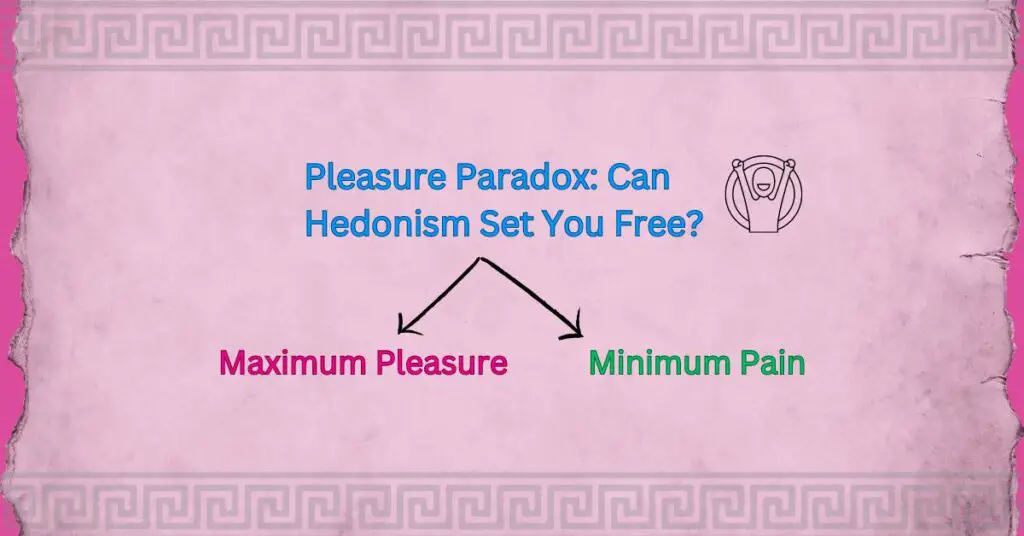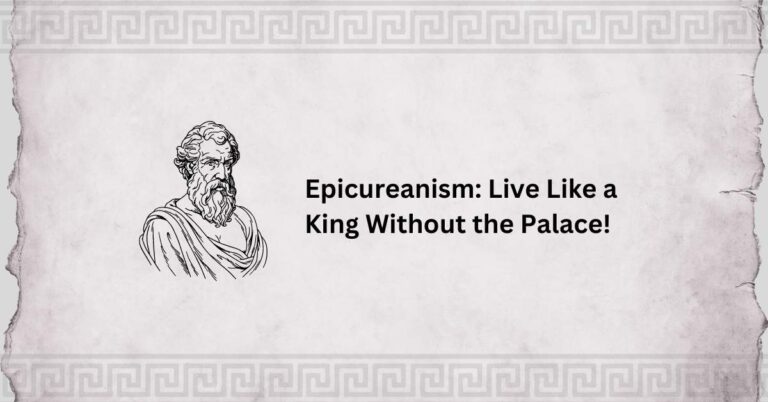Pleasure Paradox: Can Hedonism Set You Free?
Hedonism holds a simple truth: it’s the pursuit of pleasure. This philosophy suggests that happiness, found through pleasure, is the ultimate goal of life. The roots of hedonism stretch back to ancient times, with thinkers like Epicurus promoting the idea that pleasure is the chief good. But it’s not just an ancient relic; this philosophy has evolved, influencing modern views on happiness and well-being.
Why talk about hedonism today? Well, in our fast-paced world, understanding this philosophy can shed light on our choices and challenges. It raises key questions: What really makes us happy? Are we chasing the right kinds of pleasures? Discussing hedonism opens up a dialogue about how we live our lives and prioritize our happiness, which is crucial in today’s stress-filled society.
Stay tuned as we explore how this age-old concept still impacts our daily lives and decisions. It’s not just about indulging every whim—it’s about understanding the path to true contentment.
Understanding Hedonism:
What is Hedonism?
Philosophical Definition: Hedonism is a philosophy centered on the pursuit of pleasure. It posits that pleasure is the ultimate intrinsic good. Philosophically, hedonism argues that living a good life means maximizing pleasure and minimizing pain.
Psychological Aspects: From a psychological perspective, hedonism explores how pleasure influences our behavior and decision-making. It’s not just about what activities bring us joy. Hedonism examines how our brains react to pleasure and the broader effects on our choices and lifestyles.
This understanding of hedonism highlights its importance in both personal satisfaction and ethical decision-making. It’s not merely about indulging desires; it’s about appreciating pleasure’s role as a fundamental driver in our lives. As we dive deeper, we’ll see how this philosophy impacts our personal happiness and societal norms.
Types of Hedonism:
Ethical Hedonism: Ethical hedonism is the view that our moral duty is to maximize pleasure and minimize pain. This philosophy suggests that the rightness of an action depends on how much happiness it can produce. It’s a principle that challenges us to consider the consequences of our actions through the lens of pleasure.
Psychological Hedonism: Psychological hedonism asserts that humans are wired to seek pleasure and avoid pain. This isn’t just a choice but a fundamental aspect of human nature. Understanding this can illuminate why we behave as we do, often driven by the pursuit of immediate gratification.
Normative Hedonism: Normative hedonism provides guidelines on how pleasure should influence our decisions. It suggests that the pursuit of pleasure can lead to a well-lived life if guided by certain norms and standards. This form emphasizes that while pleasure is essential, it must be pursued wisely and ethically.
Each type of hedonism offers a unique perspective on the role of pleasure in human life, challenging us to think about how we prioritize happiness and the ethical implications of our pleasure-seeking behaviors. As we explore these types, we’ll uncover more about how they shape our understanding of a good life.
Key Philosophers and Their Views on Hedonism
Father of Hedonism: While hedonistic ideas existed before him, Aristippus of Cyrene is generally considered the founder of the first formal school of hedonism in ancient Greece. His school, Cyrenaicism, focused on pleasure as the highest good.
Epicurus and the Concept of Simple Pleasures: Epicurus, a philosopher from ancient Greece, championed the idea that the best pleasures are the simplest ones. He believed that true happiness comes not from indulging in luxury but from enjoying life’s basic pleasures—like good food, the company of friends, and peace of mind. Epicurus taught that by focusing on these simple joys, we can achieve a tranquil life free of unnecessary pain and worry.
John Stuart Mill and Utilitarianism: John Stuart Mill, a 19th-century philosopher, expanded on hedonistic ideas through his theory of utilitarianism. Mill argued that actions are right if they promote happiness and wrong if they produce the opposite. His approach was revolutionary because it proposed that the measure of a society’s success is the happiness of its people. Mill’s thoughts suggest that personal pleasure should be balanced with the greater good, making his interpretation of hedonism both practical and socially conscious.
Robert Nozick and the “Experience Machine” Argument: Robert Nozick, a modern philosopher, introduced a thought experiment called the “experience machine.” This device would allow people to experience whatever pleasurable scenarios they wished, completely indistinguishable from reality. Nozick used this concept to question whether hedonism alone could define a good life. He argued that people would choose not to plug into such a machine, suggesting that they value being in a real, authentic state over mere pleasure. Nozick’s argument challenges us to think about the depth and authenticity of our pleasures.
These philosophers each bring a unique perspective to hedonism, inviting us to reflect on how we seek out and value pleasure in our lives. Their ideas continue to influence contemporary discussions about happiness and the ethical implications of our pursuit of pleasure.
The Benefits of Hedonism:
Psychological Benefits of Pleasure-Seeking
Stress Reduction and Mental Health Improvements: Engaging in activities that bring us pleasure can significantly reduce stress and improve our mental health. When we do things we enjoy, our bodies release endorphins, the brain’s feel-good chemicals. This natural boost can alleviate feelings of depression and anxiety, providing a clear mental benefit to regularly incorporating pleasure into our lives. By prioritizing activities that bring joy, we can maintain a healthier mental state, helping us to cope with the daily pressures of life more effectively.
Enhanced Creativity and Productivity: Pleasure also plays a crucial role in enhancing our creativity and productivity. When we are happy and fulfilled, our minds are freer to think creatively, solve problems, and generate new ideas. Engaging in enjoyable activities can refresh our minds, breaking the monotony and sparking inspiration. This rejuvenation often translates into increased productivity, as a happy mind is more motivated and less prone to burnout. Regular doses of pleasure can, therefore, be seen as essential for sustaining high performance in both personal and professional spheres.
By embracing the psychological benefits of pleasure-seeking, we not only enhance our well-being but also set the stage for greater personal and professional achievements. Hedonism, in this sense, becomes more than just a pursuit of fleeting joys; it’s a strategic approach to living a balanced, productive life.
Societal Benefits of Hedonism
How Hedonism Can Lead to Economic Growth: Hedonism can spur economic growth by fueling consumer spending and innovation. When individuals pursue pleasure, they often invest in experiences and products that enhance their enjoyment of life. This spending stimulates demand in sectors like tourism, entertainment, and luxury goods. Moreover, as people seek new and better ways to experience pleasure, businesses are driven to innovate, leading to new products and services. This cycle of consumption and innovation can lead to substantial economic expansion and job creation.
Its Role in Promoting Freedom and Personal Autonomy: Hedonism also plays a crucial role in promoting personal freedom and autonomy. By valuing pleasure, societies may encourage individual choice and self-expression. This emphasis on personal satisfaction can lead to a more tolerant society where people are free to pursue their own happiness as long as they do not harm others. Additionally, when individuals feel they have the liberty to make choices that align with their desires, they are likely to feel more empowered and engaged in their community. This empowerment can foster a more vibrant, dynamic society where diversity and personal growth are celebrated.
These societal benefits highlight that hedonism isn’t just about individual indulgence; it has broader implications that can contribute to the health and vitality of entire communities. By understanding and integrating hedonistic principles, societies can create environments that not only boost economic activity but also support the well-being and autonomy of their citizens.
Criticisms and Challenges of Hedonism:
Common Misconceptions About Hedonism
A widespread misconception about hedonism is that it promotes reckless indulgence without concern for consequences. Many assume hedonism encourages an unsustainable lifestyle of constant pleasure-seeking, ignoring long-term goals or responsibilities. However, true hedonism, especially ethical hedonism, often emphasizes sustainable pleasure that does not lead to future pain or regret, balancing short-term desires with long-term well-being.
Ethical Dilemmas and Criticisms
Hedonism faces several ethical criticisms, particularly around the question of whether pursuing personal pleasure justifies actions that might harm others. Critics argue that if everyone seeks only their happiness, societal norms and collective responsibilities may be undermined. This raises significant ethical questions about the limits of pursuing personal pleasure and the responsibilities we hold towards others in our community.
Does Hedonism Lead to Selfishness?
A critical challenge hedonism encounters is the perception that it inherently leads to selfishness. If individuals prioritize their pleasure above all else, it might seem natural that they would act without regard for others’ feelings or needs. However, proponents of hedonism can argue that understanding and pursuing balanced pleasures can lead to greater empathy and social connection rather than selfish isolation.
Potential Negative Impacts on Society
If not carefully managed, hedonism might encourage a culture overly focused on materialism and immediate gratification, potentially leading to issues like consumer debt, environmental degradation, and social inequality. These potential impacts require a nuanced understanding of hedonism that advocates for moderation and the consideration of long-term consequences.
Balancing Hedonism with Responsibility
The key to addressing the challenges of hedonism lies in balancing the pursuit of pleasure with ethical responsibility. This balance involves recognizing the importance of pleasure in our lives while also considering the broader impact of our actions on our community and environment. Educating individuals on the benefits of moderate, thoughtful hedonism could help cultivate a society that values both personal happiness and collective well-being.
By critically examining these challenges and misconceptions, we can foster a more informed and balanced view of hedonism that acknowledges both its potential benefits and its limitations.
Hedonism in Practice:
Everyday Examples of Hedonism
Hedonism manifests in our daily lives more often than we might realize. It appears every time we savor a favorite meal, enjoy a lazy afternoon, or indulge in a spa day. These moments, driven by the pursuit of pleasure, illustrate how hedonism is not just a philosophical concept but a practical part of everyday existence.
Leisure Activities
Leisure activities are a primary way people engage in hedonistic behavior. Whether it’s playing video games, hiking in nature, or attending a music festival, these activities are chosen for the joy they bring. They help us recharge and are essential for a balanced, happy life, showcasing how hedonism contributes positively to our mental and physical health.
Consumption of Art and Culture
Art and culture consumption is another area where hedonism shines. People visit galleries, watch movies, or read novels mainly for pleasure. These activities entertain and enrich our lives, providing deep personal satisfaction and connecting us with broader human experiences and emotions.
How Different Cultures View and Practice Hedonism
Cultural perspectives on hedonism vary significantly. Some cultures may emphasize community and familial happiness over individual pleasure, while others might promote personal enjoyment and self-expression as vital components of a well-lived life. This diversity in practice and value systems shows the flexibility of hedonism as a concept, adaptable to different societal norms and values.
The Role of Technology in Promoting or Hindering Hedonism
Technology plays a dual role in the practice of hedonism. On one hand, it provides new avenues for pleasure, such as virtual reality experiences and social media, which allow people to experience novel forms of entertainment and connection. On the other hand, technology can also hinder hedonistic enjoyment by fostering addictive behaviors and reducing face-to-face interactions, potentially leading to isolation and dissatisfaction.
By understanding how hedonism is woven into various aspects of life and how it is shaped by technology and culture, we can better appreciate its role in shaping our pursuit of happiness and satisfaction. This practical application of hedonism helps to demystify the concept and integrate it into the fabric of everyday life, showing its relevance and importance in contemporary society.
The Future of Hedonism:
Trends Influencing the Perception and Practice of Hedonism
As society evolves, so too does the perception of hedonism. Modern trends, including the growing emphasis on mental health and well-being, are reshaping how we view and practice the pursuit of pleasure. Increasing awareness of the psychological benefits of balanced lifestyles encourages a more positive view of hedonism, promoting it as a legitimate aspect of a healthy life rather than a mere indulgence.
The Rise of Digital Experiences
Digital experiences are significantly influencing modern hedonism. Virtual reality, online gaming, and digital streaming services offer new ways to experience pleasure from the comfort of our homes. These technologies make it easier to access a wide range of hedonistic pleasures, from exploring virtual worlds to binge-watching series, reflecting how technological advancements continue to expand the ways we can pursue happiness.
Changes in Global Economic and Cultural Dynamics
The global economic landscape and shifting cultural dynamics also play crucial roles in the evolution of hedonism. As economies grow and change, new wealth and changing social norms can lead to different forms of consumption and pleasure-seeking. In emerging markets, for instance, growing middle classes are increasingly able to pursue leisure and luxury, altering local attitudes towards hedonism.
The Potential Role of Hedonism in Future Societal Development
Looking forward, hedonism could play a pivotal role in societal development. As societies become more focused on sustainability and ethical living, the concept of hedonism might shift towards more mindful, environmentally conscious forms of pleasure. This “ethical hedonism” could promote a lifestyle that seeks personal joy and fulfillment without compromising the welfare of others or the planet.
The future of hedonism appears dynamic and influenced by technology and cultural shifts, and it needs a deeper understanding of its implications. As we continue to explore and redefine what makes us happy, hedonism will likely adapt, potentially leading to more nuanced and holistic approaches to finding pleasure and satisfaction in our lives. This evolution will challenge us to consider not only how we pursue pleasure but also the broader impacts of those pursuits on our world and future generations.
Check out our individual blogs on Cynicism and Epicureanism if you want to learn about some other major types of philosophy!
Conclusion
Throughout this exploration of hedonism, we’ve delved into its definitions, types, and influential philosophers who have shaped our understanding of the pursuit of pleasure. We’ve also examined the psychological and societal benefits that hedonism can offer, from reducing stress and enhancing creativity to contributing to economic growth and promoting personal autonomy.
Yet, the journey through hedonism isn’t without its challenges and criticisms. Balancing personal pleasure with ethical responsibilities and societal expectations remains a complex endeavor. Hedonism encourages us to seek happiness, but it also prompts us to consider how our pursuit impacts others and the world around us.
As we move forward, the future of hedonism appears intertwined with technological advancements and shifting cultural dynamics, promising new ways to experience pleasure while also posing questions about authenticity and sustainability.
Now, I’d love to hear from you! How do you integrate pleasure into your life? Do you see hedonism as a guiding principle, or do you approach it with caution? Share your thoughts and experiences in the comments below—let’s continue this fascinating discussion about what it means to live a life devoted to seeking pleasure.



